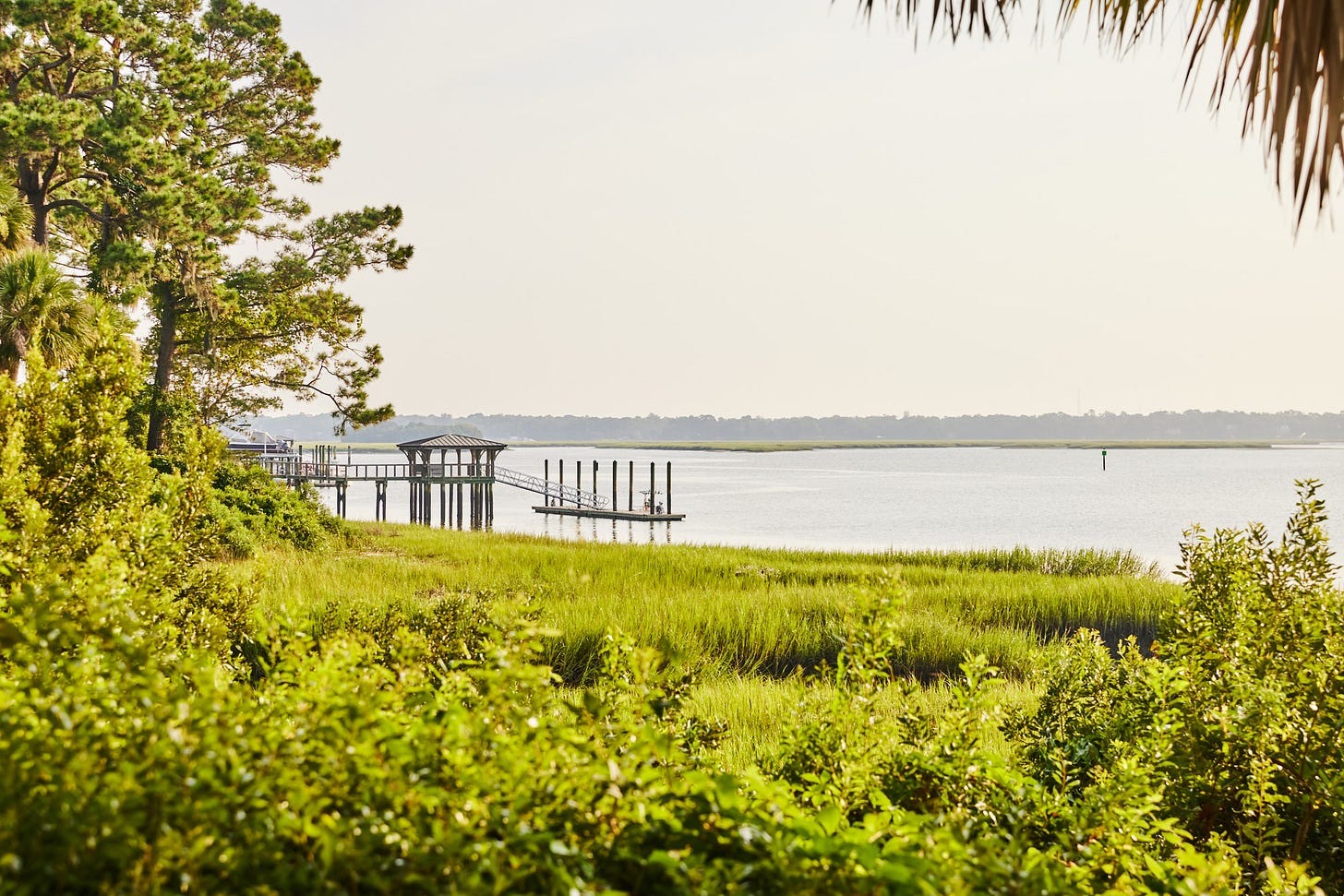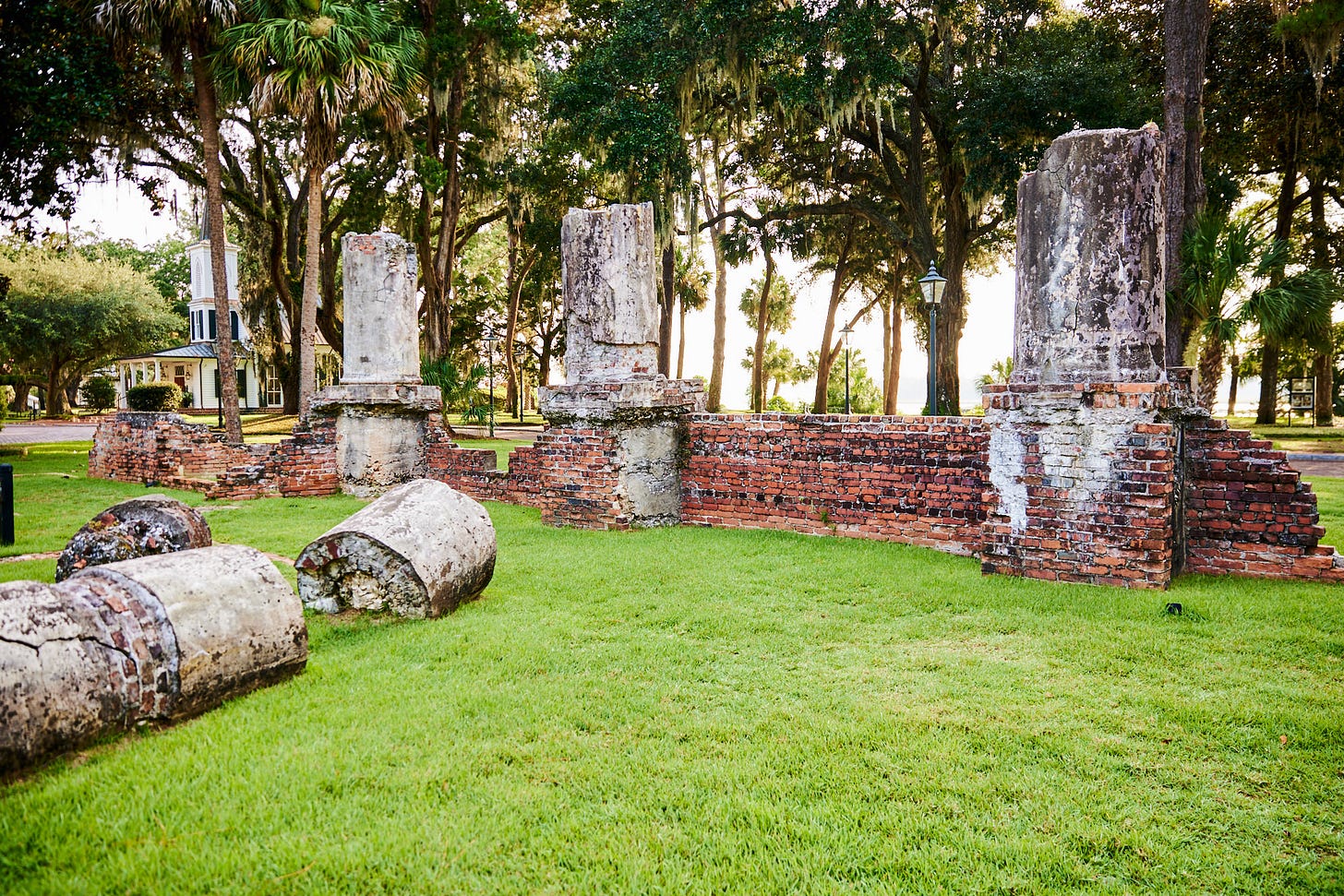Why We’ve Gathered In South Carolina
We’ve relied too heavily on the free-market system and constitutional order to right the American ship
America is a nation in distress. We are suffering from cultural problems, personal problems, and downstream from these, political problems. Many of us are hoping elected officials and bureaucrats will save us, and are somehow surprised when they don’t. In reality, they can’t even if they wanted to, and the solution comes down to us: the American people. We enjoy the fruits of our forefathers’ labors, and future generations will count us among those forefathers. What will we have left our descendants? This question brings Common Sense Society’s friends and members together this week in South Carolina’s beautiful Beaufort County for our first Leadership Summit.
A cabin at the Common Sense Leadership Summit in South Carolina. CSS.
Those of us here, as well as our supporters around the U.S. and our world, recognize we’ve relied too heavily on the free-market system and even the constitutional order to right our ship. Both have led to our unparalleled freedom, opportunity and prosperity, but they were systems refined over time and built by a particular people with a particular history and a particular culture. Some of their reforms worked, others didn’t—and our forefathers learned from it.
We Americans are not mere inhabitants of the here and now, but beneficiaries of four hundred years of culture and traditions, starting with the first European settlers. This legacy informs our understanding of law, government, and economics. The Founding Fathers’ brilliant system of government enabled those freedoms and energetic economic exchanges by empowering citizens rather than government. By tapping into the Enlightenment ideas conceived in the continent they’d left behind—Montesquieu on separation of powers, John Locke on property, Adam Smith on free enterprise and capitalism—they built a free, prosperous, and more just new world.
When Alexis de Tocqueville traveled the United States in the early 1800s, he focused on the intangibles: voluntary exchange; American charity; our drive to create institutions and civic associations; and our need to engage in face-to-face exchange, especially through houses of worship. He knew these intangibles were essential to whether we’d flourish or die.
Docks at the Common Sense Leadership Summit in South Carolina. CSS.
America has let this robust system of exchange wither, and the effects of this neglect are visible everywhere. There is a crisis of confidence. The focus on identity politics and vicious, coercive exchange, instead of a persuasive, good-faith willingness to appeal to our fellow citizens is a prominent example. But we are determined to course correct. We know that America is not one election or piece of legislation away from reversing our country’s decline.
We have to right and rebuild our civic institutions and associations. Civil society is our republic’s wellspring and lifeblood, but it is intangible: it is very difficult to teach, to replicate artificially, and to manipulate. Many generations learned civil society through participation and education, but our educational institutions have abandoned their mission to transfer wisdom, basic skills, and knowledge to the next generation, and have become temples of ideology. And so we’ve got our work cut out for us. And the leaders in education, civic engagement, business and journalism gathered here at CSS’s inaugural Leadership Summit understand that. Some of our conversations might appear political, but they focus on the bonds and the sinews and daily intangibles that have made us great, and not the partisan politics of election cycles, campaigns, or legislation. If we are to remain great, we must learn how to rebuild these bonds, while teaching and inspiring others to do the same.
Spanish Moss at the Common Sense Leadership Summit in South Carolina. CSS.
The rhetoric of American conservatives tends to over-rely on abstract economic arguments about capitalism and efficiency while failing to speak of local community, morality, and belonging, or address claims of justice. It’s a dangerous tendency and a shame that American Marxists use that language far more readily. It’s our rhetoric to own, because we are the ones who understand that morality, justice, and culture created our country. We understand the moral culture and tradition that made our free enterprise system possible. We understand the Enlightenment ideas about principles of government and justice that made our Constitution a reality. Our forefathers realized that morality, justice, and culture were better served and more likely to endure under systems that reflected human nature and protected our God-given rights.
G.K. Chesterton observed that common sense most often comes to us in the form of tradition. Tradition is the sum total of what has worked in the past, ways of acting that have stood the test of time, and have gotten us here. Our world can’t be made wholly new in one generation. And this is why the disrespect and destruction of our forefathers and traditions over the last three years is so disturbing. Our monuments and institutions represent our imperfect history, but they are the people and places that have brought us here. Common Sense Society’s founding advisor, the late Sir Roger Scruton, warned that good things are easily destroyed and not easily created.
The ruins of a 1902 mansion at the Common Sense Leadership Summit in South Carolina. CSS.
These challenges animate all that we do. This week amidst the Spanish Moss and alligators, and also going forward, we are focused on how rare all the good things we have are; how hard they were to create, sustain, and defend; and how easily a growing number of Americans want to toss them out, come what may. Our culture is not merely disposable, and we are determined to restore it.
You can listen to Marion Smith discuss these ideas on Richmond's Morning News with John Reid here.









Dismemberment of the United States the greatest of evils.
Other misfortunes may be borne, or their effects overcome. If disastrous war should sweep our
commerce from the ocean, another generation may renew it; if it exhaust our treasury, future
industry may replenish it; if it desolate and lay waste our fields, still, under a new cultivation,
they will grow green again, and ripen to future harvests. It were but a trifle even if the walls of
yonder Capitol were to crumble, if its lofty pillars should fall, and its gorgeous decorations be all
covered by the dust of the valley. All these might be rebuilt. But who shall reconstruct the fabric
of demolished government? Who shall rear again the well-proportioned columns of
constitutional liberty? Who shall frame together the skillful architecture which unites national
sovereignty with State rights, individual security, and public prosperity? No, if these columns
fall, they will be raised not again. Like the Coliseum and the Parthenon, they will be destined to
a mournful, a melancholy immortality. Bitterer tears, however, will flow over them than were
ever shed over the monuments of Roman or Grecian art; for they will be the remnants of a more
glorious edifice than Greece or Rome ever saw, the edifice of constitutional American liberty.
Daniel Webster "The Character of Washington" February 22, 1832
The Smithean free market model as originally conceived posited an interlocking mosaic or jigsaw of small local markets. Essential to that function was an approximate parity of power and influence between individual consumers and small local producers. In those days there were only small local producers. If one of these small producers failed then there would be others to rapidly take its place.
At that time communications were poor. As a result different places did things differently. For example, I once saw a French tourist advert proclaiming that there were no less than 246 varieties of local French Cheese. These evolved from the time when the horse was the only way of getting around on mud track roads. Today, in a world dominated by a handful of huge food and retail corporations and rapid communication, there would not be 246 but 6, which would be all but indistinguishable on a blind tasting.
Thus I am constantly amazed at how few people understand the difference between capitalism and corporatism. At the point at which a given market is dominated by a small handful of huge corporations, easily able to benchmark one another and indeed often overlapping in their management, research, mutual knowledge etc. to the point of constituting an oligopoly, if not a monopoly in all but name, the Smithean free market model breaks down. Product, quality and price uniformity increasingly rules.
Thus the mosaic of small local markets is replaced by a global or continental single market (as with the European Union). Add to that a huge corpus of legislation (again pace the EU) insisting that we must all do things in the same way and the difference between one brand and another becomes little more than labelling, presentation and badge engineering. And from the financial standpoint, someone sneezes in Singapore and the whole world catches pneumonia.
In any event a market is like the Cyclops. It is a one eyed beast that can only ever give a monochromatic, two dimensioned view of the world. A market cannot, of itself, yield an aesthetic or ethical result. Experience teaches us that even its powers of prediction are limited and untrustworthy. For example, and speaking from a UK context, our towns contain a wealth of old and valuable buildings which form part of our national identity. But had not campaigners fifty and sixty years ago, succeeding in arresting wholesale demolition of these areas, we would now have concrete everywhere. An aesthetic non-market force had to intervene.
One of the principle tools of Corporatism is the cost externality, Again, I am amazed at how few people would know a cost externality of one fell out of a tree and hit them on the head. The Corporation pockets the profit and dumps the downside costs onto the taxpayer. Inadequate wages have to be subsidised through the welfare system again at huge cost to the taxpayer, not to mention environmental clean-ups, infrastructural dilapidations and a host of other issues.
So where, in any part of the globe, is the new generation of trust busters willing and able to disaggregate these corporate giants and re-localise the economy? Does anyone even recognise the problem?